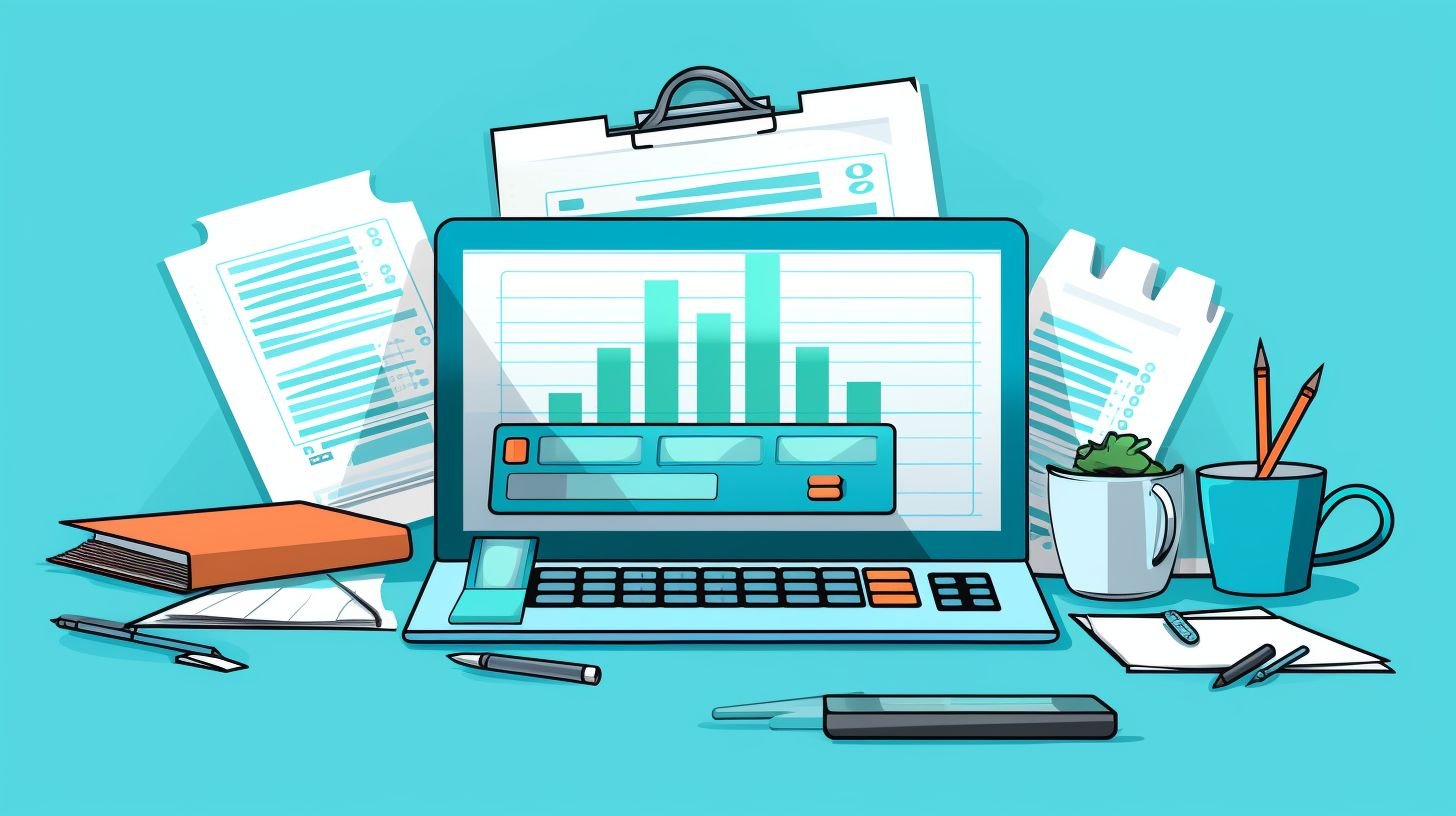Budget Planning For Small Business Owners

We know the hurdles you’re facing as a small business owner, especially when it comes to budget planning. Trust us – we’ve been on this road ourselves and after taking a deep dive into research, we found that over half of all small businesses don’t make it past their fifth anniversary due to financial missteps.
So, what’s the solution? We are here with an easy-to-follow guide for crafting and maintaining an effective budget for your sprouting venture. This blog post will cover everything from why budgets are crucial to nifty tips for successful implementation of your plan.
So sit tight! You’re just one step away from cementing the financial foundation of your business.
Key Takeaways
- Budget planning is crucial for small business owners to effectively manage their finances and ensure long-term success.
- A small business budget is a plan for your money that helps you track where it goes, plan your spending and saving, and understand if your business is growing.
- Small businesses need a budget to avoid overestimating expenses, understand their sales cycle, manage time efficiently, involve employees in financial decisions, ensure fair compensation, and identify potential risks.
- Steps to create a small business budget include gathering financial information, identifying revenue streams, determining fixed costs and variable costs, and setting aside a contingency fund.
Understanding the Importance of Budgeting for Small Businesses
Budgeting matters a lot for small businesses. It helps us keep track of where our money goes. With a budget, we can plan how to spend and save money in smart ways. This means we know when and where our business is making or losing money.
We can see if our business is growing with the help of a budget too. We also get ready for things that may cost more than we think, like when projects have unexpected costs. A budget helps us avoid running out of money during slow times in our sales cycle as well.
All these factors show the importance of budgeting for small businesses.
What is a Small Business Budget?
A small business budget is a plan for your money. It tells you how much money you think you will earn and how much money you plan to spend. The budget is usually made for the future.
It can be for one month, three months, six months, or even one year.
Creating this kind of budget may seem hard. But it’s not! You just need to know two things: How much money do you plan on earning? And how many things do you want to buy or pay for? Then, by being smart about these facts, the business owner can make decisions that help the company grow.
Just like we use a map when driving to new places, businesses use budgets as their map too! This “money map” helps guide them so they don’t get lost in costs they didn’t see coming.
It also allows them to save up cash reserves if they earn more than what they expected.
So with a solid budget in place, running a small business becomes less stressful and more focused on growth! Isn’t that an awesome tool every small business should have?
Why Small Businesses Need a Budget?

Small businesses need a budget to avoid overestimating expenses, understand their sales cycle, manage time efficiently, involve employees in financial decisions, ensure fair compensation, and identify potential risks.
Read on to gain valuable insights into the importance of budgeting for small business owners.
Overestimating expenses
Many times, small business owners guess their costs too low. This can lead to a big problem if sudden costs come up. To fix this, they should try overestimating expenses. This means that they plan for the costs to be higher than what they think it will be.
When you do this, you have extra money ready in case something happens. It helps keep your business safe and sound!
Understanding your sales cycle
Sales come and go. You sell more at times, and less at others. This is your sales cycle. Know it well when you make a budget for your small business. By doing so, you can plan for slow periods with fewer sales.
For example, a store that sells swimsuits might not sell much in winter. So they must save more money in summer to cover their costs during the colder months.
Time management
Managing time effectively is crucial for small business owners when it comes to budgeting. As a business owner, I understand that time is a valuable resource that should be taken into account when creating and monitoring the budget.
By allocating enough time for financial planning, expense tracking, and reviewing financial reports, I can ensure that my business stays on track financially. This includes setting aside dedicated periods each week or month to analyze expenses, review sales data, and identify areas where cost savings can be made.
Time management also involves prioritizing tasks related to the budgeting process and delegating responsibilities to employees when necessary. By managing my time effectively in relation to budgeting, I can make informed decisions about spending and allocate resources wisely for the long-term success of my business.
Employee involvement
When employees are involved in the budgeting process, their insights and perspectives can be extremely valuable. They have a unique understanding of the day-to-day operations and can provide input on expenses, revenue projections, and cost-saving measures.
When employees feel included in budget planning, it improves communication and teamwork within the organization. This involvement also helps them understand and support financial goals better.
In addition to these benefits, employee participation in budgeting leads to increased motivation and engagement in the workplace. Since they have a say in financial decisions that affect their work environment, they feel more invested in achieving financial targets.
Fair compensation
As a small business owner, it is important to remember the significance of fair compensation for your employees. While budgeting for your business, setting aside funds to ensure that your team receives adequate pay is crucial.
By compensating your employees fairly, you not only motivate them but also create a positive work environment that leads to increased productivity and loyalty. It’s essential to prioritize paying yourself as well, as many small business owners often overlook this aspect in favor of saving every penny.
Remember, fair compensation contributes to employee satisfaction and helps build long-term success for your business.
Identifying risks
Identifying risks is crucial for the financial future of a small business. By understanding potential risks, such as market trends or unexpected costs, a business can take proactive measures to mitigate them.
Regularly revisiting and adjusting the budget allows for identifying and accounting for new risks that may arise. It’s also important to pay attention to the sales cycle, as slow periods can pose financial risks that need to be planned for.
Involving employees in the budgeting process can provide valuable insights and perspectives for identifying risks that may have been overlooked. Budgeting helps control spending and ensures that cash reserves are sufficient to manage any identified risks effectively.
Steps to Create a Small Business Budget

To create a small business budget, start by gathering all of your financial information and identifying your revenue streams. Determine your fixed costs and variable costs, and make sure to set aside a contingency fund for unexpected expenses.
Create a profit and loss statement to track your income and expenses accurately.
Gather Your Financial Information
To create a small business budget, you need to gather your financial information. This includes gathering all the important documents and data related to your business’s finances. Start by collecting your bank statements, invoices, receipts, and any other financial records.
You should also have a clear understanding of your income sources and expenses. Analyze previous sales data to identify trends in revenue and understand the seasonal patterns of your business.
Don’t forget to consider fixed costs like rent, debt repayments, employee salaries, insurance, and variable expenses such as raw materials or utility costs. By having all this information at hand, you’ll be able to make more informed decisions when creating a budget for your small business.
Identify Your Revenue Streams
To create an effective small business budget, it’s important to identify your revenue streams. Revenue streams are where the money comes into your business. They can include sales of products or services, rental income, or even investments.
By accurately tracking and analyzing your revenue streams, you can make informed decisions about how to allocate your budget. It’s essential to evaluate each revenue stream for profitability and sustainability before incorporating it into your budget.
Consider both fixed (consistent) and variable (fluctuating) revenue streams when creating your small business budget.
Determine Fixed Costs
Determining fixed costs is a crucial step in creating a small business budget. Fixed costs are expenses that do not change, regardless of the level of business activity. These can include things like rent, employee salaries, insurance premiums, and property taxes.
By identifying these fixed costs upfront, you can accurately allocate funds to cover these essential expenses and ensure their timely payment. This helps you maintain financial stability and avoid any surprises or cash flow issues down the line.
It’s important to regularly review and update your fixed cost estimates as circumstances may change over time. Taking into account all relevant factors will help you make informed decisions about your business finances and set realistic financial goals for growth and success.
Determine Variable Costs
To create an effective small business budget, it’s important to determine your variable costs. Variable costs are expenses that change depending on the level of production or sales in your business.
These costs can include things like raw materials, direct labor, shipping fees, and packaging supplies. By accurately identifying and tracking these variable costs, you can better understand how they impact your overall financial health and make informed decisions about pricing, production levels, and profitability.
It’s also crucial to regularly review and adjust your variable cost estimates as market conditions change or as your business grows. This will help you stay on top of your finances and ensure that you’re making smart financial choices for the future success of your small business.
Set Aside a Contingency Fund
Creating a small business budget involves setting aside a contingency fund. This fund is crucial because it helps to cover unexpected expenses or emergencies that may arise in the course of running your business.
It serves as a safety net, providing you with financial stability and peace of mind. By allocating a percentage of your budget to the contingency fund, you are better prepared to handle any unforeseen circumstances that could potentially disrupt your operations.
Having this reserve ensures that you can continue operating smoothly without facing significant financial setbacks. So, make sure to prioritize setting aside a contingency fund when planning your small business budget.
A contingency fund is an essential part of any small business budget because it protects against unexpected costs and emergencies. Without one, businesses can be caught off guard and may struggle financially, especially if they have limited cash reserves or access to credit options like loans or lines of credit.
Setting aside funds for contingencies allows businesses to navigate through challenging times without compromising their financial health. It provides a cushion for operational inefficiencies, market fluctuations, and seasonal shifts in revenue streams.
Create a Profit and Loss Statement
Creating a profit and loss statement is an important part of budget planning for small business owners like me. This statement helps me understand the available resources and plan accordingly.
By tracking my income and expenses, I can control my spending and ensure that I have enough cash reserves for unexpected costs. It’s crucial to regularly revisit and adjust the profit and loss statement as my business evolves and grows.
This statement gives me insights into the financial future of my small business, allowing me to make informed decisions about its direction.
Managing Your Small Business Budget Efficiently

Managing your small business budget efficiently is vital for the financial health and success of your business. One important aspect of efficient budget management is regularly reviewing and revising your budget to ensure it aligns with your business goals and objectives.
By monitoring your expenses, you can identify areas where costs can be reduced or eliminated, maximizing efficiency and saving money in the long run.
Another key factor in managing your small business budget efficiently is being proactive in identifying potential risks and planning for unexpected expenses. Setting aside a contingency fund for emergencies can help mitigate financial setbacks that may arise unexpectedly.
Additionally, it’s important to separate personal and business finances to maintain clarity and avoid overspending.
Furthermore, prioritizing fair compensation for yourself as a small business owner should not be overlooked. While it’s essential to control costs, it’s equally important to ensure you are paying yourself adequately for the time, effort, and expertise you invest in running your business.
Remember that taking care of yourself financially will enable you to better focus on growing and developing your business.
In conclusion, managing your small business budget efficiently involves regular review, identification of potential risks, separating personal finances from those of the company, setting aside a contingency fund for emergencies,and ensuring fair compensation for yourself as a small business owner.
By implementing these strategies into your budget management practices,you can improve financial stability while supporting growth opportunities for yourbusiness.
Tips for Creating a Small Business Budget
Separate your business and personal finances for better financial management. Regularly review your budget to stay on track and make necessary adjustments. Find out how accounting software can help you streamline the budgeting process and maximize efficiency.
Separating Business and Personal Finances
Separating business and personal finances is really important for small business owners. It helps keep things clear and organized, so you know exactly where your money is going. One way to do this is by incorporating your business and getting a federal tax ID number.
This legal separation establishes that your personal and business finances are separate entities. Another step you can take is to open separate bank accounts and credit cards for your business.
This makes it easier to track your business expenses and avoid mixing them with personal expenses. Using different accounting systems for personal and business finances also helps ensure accurate financial tracking and reporting.
Regular Budget Review
Regularly reviewing and adjusting your small business budget is crucial for financial success. As the business evolves and grows, it’s essential to revisit the budget on a regular basis.
By doing so, you can ensure that your spending aligns with your goals and objectives. Regular budget reviews help control spending, identify areas where adjustments can be made, and ensure that you have sufficient cash reserves for unexpected costs or opportunities.
It also allows you to assess the available resources and plan accordingly. Keeping a close eye on your budget will help you stay on track towards achieving long-term financial stability for your business.
The Role of Accounting Software in Small Business Budgeting
Accounting software plays a crucial role in small business budgeting. It helps business owners create a detailed financial outline based on historical data. With this software, you can track your income and expenses, analyze spending patterns, and make informed financial decisions.
By using accounting software, you can easily create budgets and compare them to actual figures with just a few clicks. This allows you to identify any discrepancies and make necessary adjustments to keep your finances on track.
Additionally, accounting software provides valuable insights into your business’s financial health, allowing you to plan for the future, maximize efficiency, and secure investment opportunities.
Overall, accounting software is a powerful tool that empowers small business owners to effectively manage their budgets and achieve their financial goals.
How Can Budget DIY Home Improvement Projects Benefit Small Business Owners?
Budget home improvement projects can greatly benefit small business owners. By taking on these DIY projects, owners can save money and improve their workspace. It allows them to personalize the environment, enhance productivity, and create a more appealing space for clients. These projects can be simple, cost-effective solutions to upgrade and maintain their premises, providing a positive impression for potential customers.
Conclusion

In conclusion, budget planning is crucial for small business owners to effectively manage their finances and ensure long-term success. By creating a realistic budget, considering expenses and revenue streams, involving employees, and regularly reviewing and adjusting the budget as needed, small business owners can better control spending, identify risks, and allocate resources efficiently.
With a well-planned budget in place, small business owners can confidently make financial decisions that support their goals and drive business growth.






